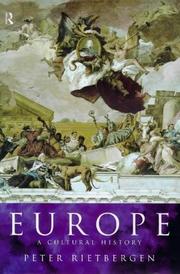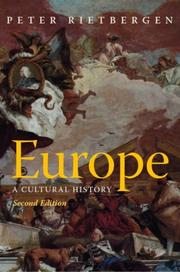| Listing 1 - 10 of 30 | << page >> |
Sort by
|

ISBN: 9060115252 Year: 1987 Publisher: Zutphen De Walburg Pers
Abstract | Keywords | Export | Availability | Bookmark
 Loading...
Loading...Choose an application
- Reference Manager
- EndNote
- RefWorks (Direct export to RefWorks)
History of the Netherlands --- History of Asia --- Both, Pieter --- Verenigde Oost-Indische Compagnie --- 745.5 --- Kunstnijverheid naar materiaal --- 929 BOTH, PIETER --- 959.4 --- Biografie. Genealogie. Heraldiek--BOTH, PIETER --- Geschiedenis van Indonesië --- Colonial administrators --- Biography. --- 959.4 Geschiedenis van Indonesië --- 929 BOTH, PIETER Biografie. Genealogie. Heraldiek--BOTH, PIETER --- 745.5 Kunstnijverheid naar materiaal --- Biography --- Civil service, Colonial --- Government executives --- Both, Pieter, --- Indonesia --- Politics and government
Book
ISBN: 9789077503768 9077503765 Year: 2007 Publisher: Nijmegen Vantilt
Abstract | Keywords | Export | Availability | Bookmark
 Loading...
Loading...Choose an application
- Reference Manager
- EndNote
- RefWorks (Direct export to RefWorks)
Imperialism --- Colonialism --- Empires --- Expansion (United States politics) --- Neocolonialism --- Political science --- Anti-imperialist movements --- Caesarism --- Chauvinism and jingoism --- Militarism --- Europe --- India --- Indland --- Ḣindiston Respublikasi --- Republic of India --- Bhārata --- Indii︠a︡ --- Inde --- Indië --- Indien --- Sāthāranarat ʻIndīa --- Yin-tu --- Bharat --- Government of India --- インド --- Indo --- Council of Europe countries --- Eastern Hemisphere --- Eurasia --- Relations --- History. --- History of civilization --- anno 1700-1799 --- anno 1800-1999 --- History --- Imperialism. --- هند --- Индия --- Europe - Relations - India --- India - Relations - Europe --- India - History

ISBN: 9004148930 904741795X 9789047417958 9789004148932 Year: 2006 Volume: 135 Publisher: Leiden Brill
Abstract | Keywords | Export | Availability | Bookmark
 Loading...
Loading...Choose an application
- Reference Manager
- EndNote
- RefWorks (Direct export to RefWorks)
In ten chapters, partly case-studies, this monograph analyzes the (new) ways in which cultural manifestations were used to create the necessary preconditions for (religious) policy and power in the Rome of Urban VIII (1623-1644). It was the intensified interaction between culture and power-politics that created what we now call ‘the Baroque’. Based on a rich variety of, hitherto largely unexplored, primary sources, the book addresses the basic issues of papal power in the post-Tridentine period. It does not study actual papal politics, but rather the cultural forms that were essential to the representation and legitimatization of the papacy’s power, both secular and religious and that (co-)determined the effectiveness of papal policy. Precisely during Urban’s long pontificate, the manifold, always imaginative and often unexpected uses of power representation became, in the end, not so much a series of cultural forms as, in a sense, the structure of early modern (Roman) society.
Papacy --- 945.07 --- 945.632 --- History --- History Italy 1527 - 1796 --- History Italy Rome --- Urban --- Barberini, Francesco, --- Barberino, Francesco, --- Barberinus, Franciscus, --- Barberini, Maffeo, --- Urbano --- Urbanus --- Rome (Italy) --- Rome (Italy : Commune) --- Rome (Italy : Governatorato) --- Rūmah (Italy) --- Roma (Italy) --- Rom (Italy) --- Rím (Italy) --- Rzym (Italy) --- Comune di Roma (Italy) --- Rome --- Civilization --- popes --- church history --- Urban VIII [Pope] --- Religion and culture --- Religion et culture --- Histoire --- Barberini family --- Art patronage. --- Rome (Italie) --- Civilisation --- Barberini, Maffeo Vincenzo, --- Barberino, Maffeo, --- Christian influences --- Rim --- Roman Empire --- Roman Republic (510-30 B.C.) --- Romi (Empire) --- Byzantine Empire --- Urbain --- Rome (Italy : Comune) --- Papacy - History - 1566-1799. --- Urbain VIII, --- Early Modern History --- Cardinal (Catholic Church) --- Gigli --- Pope --- Vatican Library

ISBN: 0415172306 0415172292 9780415172301 Year: 1999 Publisher: London Routledge
Abstract | Keywords | Export | Availability | Bookmark
 Loading...
Loading...Choose an application
- Reference Manager
- EndNote
- RefWorks (Direct export to RefWorks)
History of civilization --- Europe --- History --- Civilization --- History. --- Civilization. --- Histoire --- Civilisation --- Europe - History --- Europe - Civilization

ISBN: 0415323584 0415323592 9780415323581 9780415323598 9780415663571 9780415323584 Year: 2006 Publisher: London Routledge
Abstract | Keywords | Export | Availability | Bookmark
 Loading...
Loading...Choose an application
- Reference Manager
- EndNote
- RefWorks (Direct export to RefWorks)
From ancient Babylonian law codes to Pope Urban II's call to crusade in 1095, and from Michelangelo on Italian art in 1538 to Sting's lyrics in the twentieth century, the cultural history of Europe is a diverse and wide-ranging subject. This exceptional text expertly condenses it, explains it and introduces it to the reader in a thorough and highly readable style. Presented chronologically, "Europe : a cultural history" examines the many cultural building blocks of Europe, their importance in the continent’s cultural identity, and how the perception of Europe has changed over the centuries. Starting with the beginnings of agricultural society and ending with the mass culture of the early twenty-first century, the book uses literature, art, science, technology and music to examine Europe’s cultural history in terms of continuity and change. Rietbergen looks at how societies developed new ways of surviving, believing, consuming and communicating throughout the period. His book is distinctive in paying particular attention to the impact of other cultures on Europe, from its Celtic and German origins, to the influence of the Greeks and the Romans, the role of Christianity, and the modern day contact with Islam. The text has been thoroughly revised for the late twentieth and early twenty-first centuries, and with a wide selection of excerpts to support the arguments, lyrics from contemporary songs and many illustrations, this book is an excellent student resource for both historical and cultural studies.
Europe --- Civilization. --- History. --- Civilisation --- Histoire --- #KVHA:Cultuurgeschiedenis; Europa --- #KVHA:Geschiedenis; Europa --- 930.85 --- 930.85 Cultuurgeschiedenis. Kultuurgeschiedenis --- Cultuurgeschiedenis. Kultuurgeschiedenis --- History of civilization --- History of Europe --- Civilization --- History --- Europe - History. --- Europe - Civilization
Book
ISBN: 9061093376 Year: 1994 Publisher: Amersfoort Bekking
Abstract | Keywords | Export | Availability | Bookmark
 Loading...
Loading...Choose an application
- Reference Manager
- EndNote
- RefWorks (Direct export to RefWorks)
Civilization --- Culture --- #A9506A --- Cultural sociology --- Sociology of culture --- Popular culture --- Cultural history --- History --- Social aspects --- History of civilization --- Europe
Book
ISBN: 9061095468 Year: 2001 Publisher: Amersfoort Bekking
Abstract | Keywords | Export | Availability | Bookmark
 Loading...
Loading...Choose an application
- Reference Manager
- EndNote
- RefWorks (Direct export to RefWorks)
Cultuur-historische beschouwingen deel 2, 16de eeuw
History of civilization --- anno 1500-1799 --- anno 1800-1899 --- Bureaucracy --- Complex organizations --- Public administration --- History --- Administration, Public --- Delivery of government services --- Government services, Delivery of --- Public management --- Public sector management --- Political science --- Administrative law --- Decentralization in government --- Local government --- Public officers --- Secondary groups --- Organizational sociology --- Interorganizational relations
Book
Year: 1993 Publisher: Nijmegen : Brakkenstein,
Abstract | Keywords | Export | Availability | Bookmark
 Loading...
Loading...Choose an application
- Reference Manager
- EndNote
- RefWorks (Direct export to RefWorks)
Book
ISBN: 9061094402 Year: 2002 Publisher: Amersfoort : Bekking,
Abstract | Keywords | Export | Availability | Bookmark
 Loading...
Loading...Choose an application
- Reference Manager
- EndNote
- RefWorks (Direct export to RefWorks)
Book
ISBN: 902906756X Year: 2000 Publisher: Amsterdam Meulenhoff
Abstract | Keywords | Export | Availability | Bookmark
 Loading...
Loading...Choose an application
- Reference Manager
- EndNote
- RefWorks (Direct export to RefWorks)
| Listing 1 - 10 of 30 | << page >> |
Sort by
|

 Search
Search Feedback
Feedback About UniCat
About UniCat  Help
Help News
News